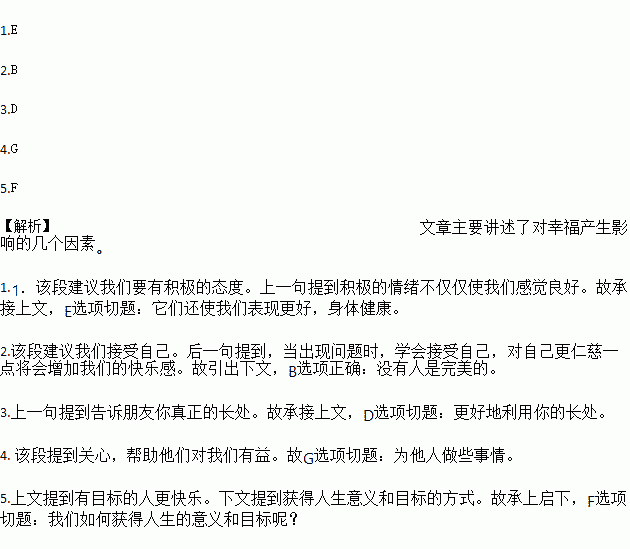题目内容
It is reported that although our genes and environment play an important role, how happy we are largely depends on our choices and activities. The following are just several areas that tend to make a big difference to people’s happiness.
Take a positive attitude
Positive emotions―like joy, gratitude, satisfaction, inspiration and pride― don’t just feel good when we experience them. 1. So although we need to be realistic about life’s ups and downs, it helps to focus on the good aspects of any situation―the glass half full rather than the glass half empty.
Accept who you are and what you are
2. Learning to accept ourselves and being kinder to ourselves when things go wrong will increase our enjoyment of life. It also helps us accept others as they are. Ask a trusted friend or colleague to tell you what they think your real strengths are. 3.
4.
Caring about others is fundamental to our happiness. Helping other people is not only good for them; it’s good for us too. It makes us happier and can help to improve our health. Giving also creates stronger connections between people and helps to build a happier society.
Take part in something bigger
People who have meaning and purpose in their lives are happier. They also experience less stress, anxiety and depression. 5. It might come from doing a job that makes a difference, or spiritual beliefs, or our family. The answers may be different for each of us but they all involve being connected to something bigger than ourselves.
A. Our broader social networks bring a sense of belonging.
B. Nobody is perfect.
C. Give them a call or offer your support.
D. Try to make more use of these.
E. They also help us perform better, and improve our physical health.
F. But where do we find meaning and purpose?
G. Do things for others.
 名校课堂系列答案
名校课堂系列答案
